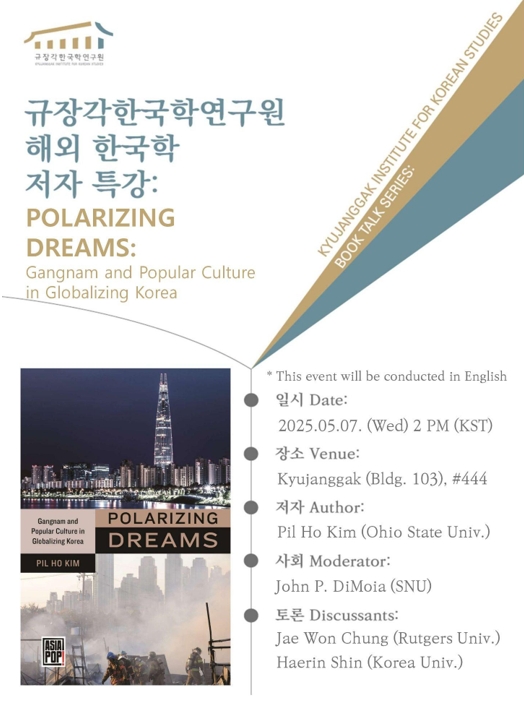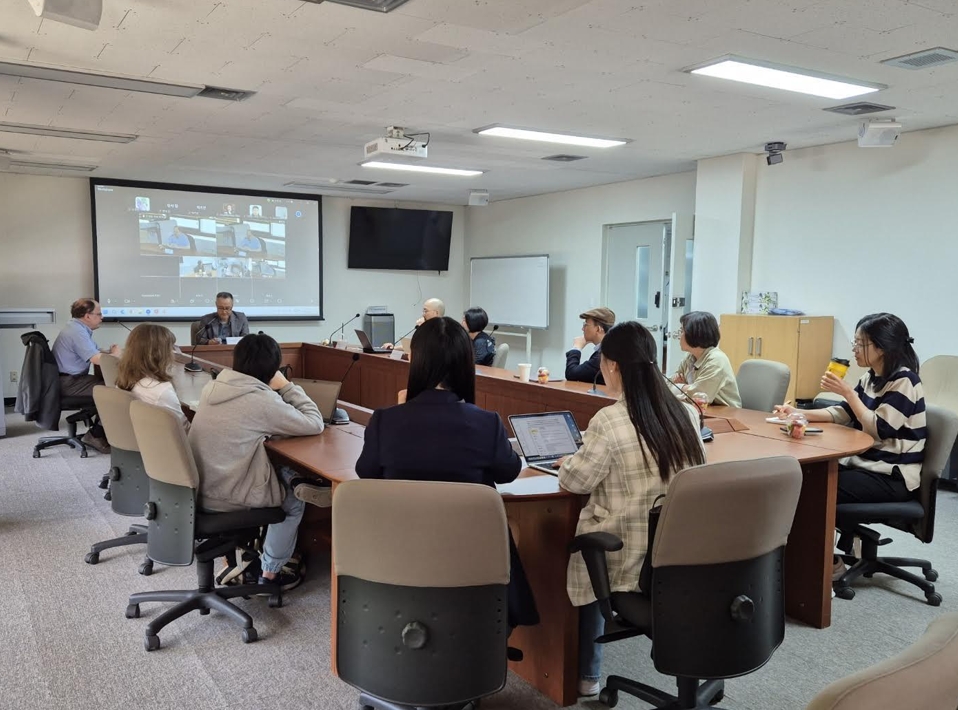For over a decade, the Kyujanggak Institute for Korean Studies has invited internationally recognized scholars and researchers of Korean studies who have published noteworthy books to their annual Book Talk Series. Through having scholars present their works, the Kyujanggak aims to introduce innovative and thought-provoking research that highlights the diverse methodologies and topics explored by overseas scholars. The series facilitates scholarly dialogue across borders and encourages broader engagement with global perspectives on Korea.
On May 7, the 2025 Book Talk Series kicked off with a lecture by Professor Kim Pil Ho from Ohio State University. As a sociologist, Professor Kim has explored a wide range of topics regarding contemporary Korea in his research, such as its popular music, cinema, urban culture, and social polarization. He is currently conducting research at the Kyujanggak as part of the Overseas Publishing Grant on his upcoming publication regarding the trans-Pacific cultural impact of the Black freedom movement on contemporary Korean history.

Poster for Installment 1 of the 2025 Book Talk Series
The book Professor Kim introduced in his talk, titled Polarizing Dreams: Gangnam and Popular Culture in Globalizing Korea, takes an interdisciplinary approach in analyzing a central yet controversial symbol of contemporary Korea—Gangnam. As Seoul’s iconic district, it serves as both the epicenter of hallyu and a site deeply entangled in social controversies. Through combining sociology, media studies, and urban studies, he explores how representations of Gangnam in cultural works reflect and reproduce broader social tensions, such as inequality, educational pressure, and gender-based violence.
In his analysis of Gangnam, Professor Kim utilized the concept of “sense of place” from phenomenology, defined as the range of human experiences associated with a specific location. He chose to focus on the relationship between a “sense of place” and human activity, more specifically, the relationship between Gangnam’s evil “sense of place” and human activity. Professor Kim explained this arises from the “unholy trinity” of speculative real estate, competitive college prep education, and entertainment industry ties to prostitution and organized crime that lies beneath Gangnam’s sparkling exterior of privilege and wealth.

Professor Kim on Polarizing Dreams: Gangnam and Popular Culture in Globalizing Korea
The chapter Professor Kim chose to focus on for the talk, titled “Place Maketh Man: Gangnam as the Locus of Social Evil,” explores the presentation of contemporary Gangnam in South Korean cinema. Cinema stands, with its immediate and visceral impact, as one of the best forms of media to explore Gangnam. For the lecture, he examined the two films The King of the Pigs and Beastie Boys. Both set in Gangnam, the films follow dismal characters and topics such as school bullying and sex work, shedding unfiltered light on the darker side of the district. The brutally realistic portrayals of unabashedly corrupt protagonists brings attention to the oft-ignored seedy interior of Gangnam. Together, these two films serve to represent the space of Gangnam as having an evil“sense of place,” which in turn affects the behaviour of the public.

Professor Kim delivering his talk
Despite this, Professor Kim remains hopeful that we will witness a shift in this evil “sense of place.” He cited recent surges in activism and protests against social injustices occurring in the area as potential proponents of change. While it is important to acknowledge the existing evil “sense of place” belonging to Gangnam, this does not mean it must remain that way forever, and as more attention is brought to its current state, the more likely it is for a positive transformation to occur.
Professor Kim’s visit to SNU marks the beginning of the Kyujanggak’s 2025 Book Talk Series. Installment 3 of the series, featuring Professors Kim Yong-Chan, Seo Soomin, and Gabor Sebo, will take place on June 26 on the topic of Locating North Korea in Communication Research. All are welcome to attend, and further updates on upcoming talks are on their way.
Written by Eusun Lee, SNU English Editor, sunnylee006@snu.ac.kr

